
Trying to nail down Seth Godin’s greatest strength is no easy task. He’s a brilliant author, marketer, speaker, and entrepreneur, but above all that, he’s truly mastered the art of getting straight to the point.
Have you seen his blog? He carefully boils each post down to a few hundred words. No fluff. No fancy sentences. Just perfectly distilled lessons.
Whether he’s writing a blog post, delivering a speech, teaching a class, or giving an interview, he holds true to this way of doing things. And his recent interview with CreativeLive was certainly no exception.
As part of the 30 Days of Genius series, CreativeLive sat down with Godin to discuss everything from failure to permission marketing to what it takes to be truly remarkable. Below you’ll find a peek into this discussion …
3 Valuable Lessons From Seth Godin
1) How to Deal With the Fear of Failure
As a marketer, it’s easy to identify with the fear of failure. When you’re stepping outside of your comfort zone — whether you’re trying a new tool or experimenting with a new medium — it’s hard not to worry about the “what ifs.”
Over the years, you learn how to live with that little fear in the back of your head. You need to. If you don’t, you’ll find it’s seemingly impossible to think outside of the box and take risks.
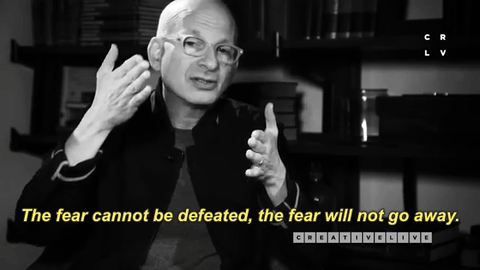
As Godin so clearly articulates it, “The challenge with letting your genius out, is that it might not work. And that expression, ‘it might not work,’ is super hard to say out loud.”
Godin goes on to explain the psychological power behind why he regularly tells himself that his next big creative risk, simply might not work.
Rather than trying to convince others that a new endeavor — like his radically different altMBA online workshop, for example — will be an immediate success, Godin makes it very clear there is always the possibility of painful failure. That’s just what happens when you take a business risk.
Instead of burying that fear of failure, he challenges himself to dance with his fears. He explains, “The fear is hardwired into us, for good reason. And the thing is, we’re just mistaken. You had a reason to be afraid during the Spanish Inquisition. You have a reason to be afraid if a baseball bat is flying into the stands.”
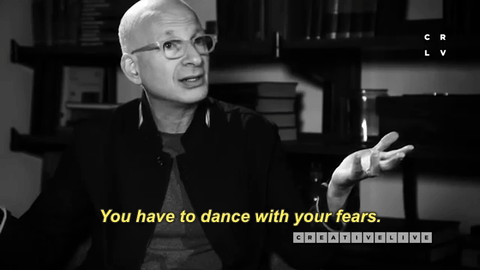
However, when it comes to taking creative risks and stepping outside of your comfort zone, we really don’t have that much to lose. It’s not a life-or-death type of decision.
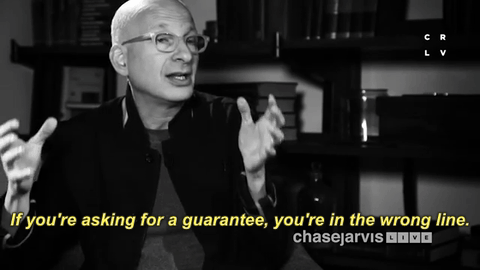
All too often, we allow our primal fears to negatively impact our decision making process when it comes to things as simple as public speaking, publishing a blog post, or trusting your instinct on a critical business decision. When in fact, the act of reminding yourself that you simply do not have all the answers, and that failure is a very real possibility, is a vital personal development stage in progression towards becoming a better version of yourself.
2) How to Define Permission Marketing
Godin has an incredibly simple definition of what permission marketing really is: “Would they miss you, if you were gone?”
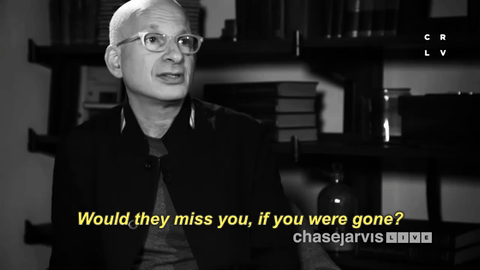
He continues, “those people — the ones you’re seeking to have an impact on — would they miss you if you didn’t show up tomorrow? Would they miss you if this new product or new project didn’t come to the world?”
In a world where we tend to obsess over things like high open rates and strong clickthroughs, Godin challenges us to look a level deeper and decide whether or not we have genuine permission to interact with our customers, leads, and subscribers … or if we’re simply being tolerated by them.
If you’re struggling with defining a sound strategy, ask yourself the question: “Would my subscribers miss me? Would I receive one, ten, or one hundred emails from them if they didn’t receive my email this week?”
How you answer that question will tell you a lot about the depth of the relationship you have with your community.
3) What It Means to Be Truly Remarkable
Remarkable.
You’ve heard the word tossed around in meetings, snuck into blog titles, and worked into recommendation letters. You’ve probably used it a few times yourself. But what does it really mean?
“It’s really easy to do that thing that people notice. That’s not remarkable, the way I use the phrase,” Godin begins.
The way he sees it, there’s a stark difference between doing something that simply gets noticed, and doing something that’s truly remarkable. When you do something remarkable, people begin telling others, and the word about what you’re doing spreads in a very genuine manner.
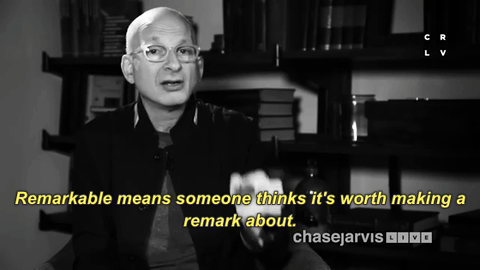
But getting people talking is only half the battle. Godin’s analogy is that it’s easy to get noticed by wearing plaid to a funeral. But is that remarkable? Absolutely not.
The real challenge is to get people to remark about what you’re doing, but to do so in exactly the way you want them to.
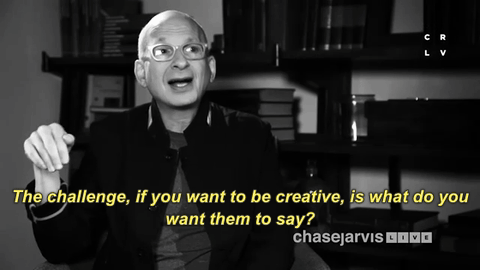
Now, it’s entirely different when it comes to strategically crafting what you want your audience to say, after they see or hear your message.
“If we want them to say, ‘you need to see this, it will transform you,’ or if we want them to say, ‘can you believe how generous that act was?’ if we want them to say, ‘this is the new fresh thing,’ then go build that,” Godin explains.
What’s more, you need to very thoughtful about the creation process. You need to create your work in a way that inspires others to share it — in a way that helps you grow.
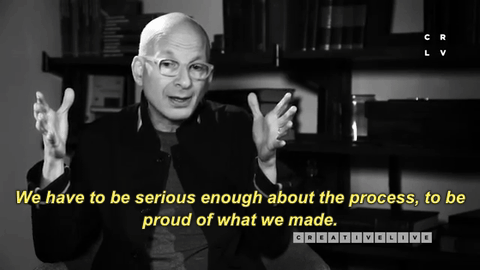
To do that, Godin explains, “We have to be serious enough about the process [of creating great work], that we’re proud of what we made, and we did it in a way that the kind of person we care about, tells someone else.”
This is the true definition of creating impactful work. This type of work is different in that it’s inherently viral within the communities who deeply care about the subject matter. And in Godin’s eyes, that’s the type of work you want to strive for. That’s the work that matters.
Want more from Seth Godin? Check out the full ’30 Days of Genius’ interview from CreativeLive here.
![]()


